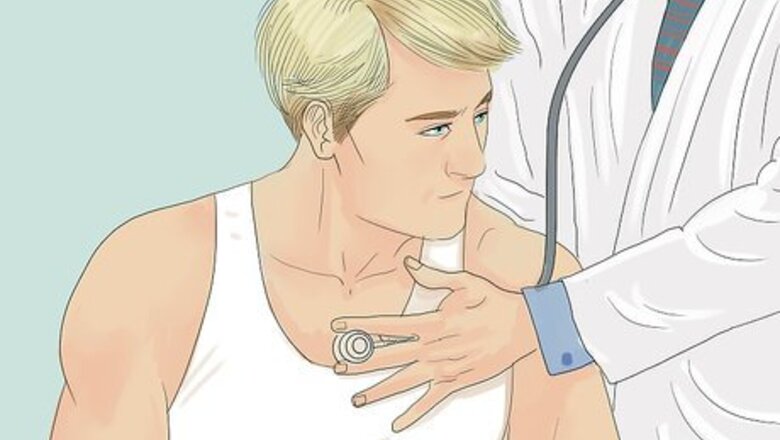
views
Seeking Medical Care for Serious Wheezing
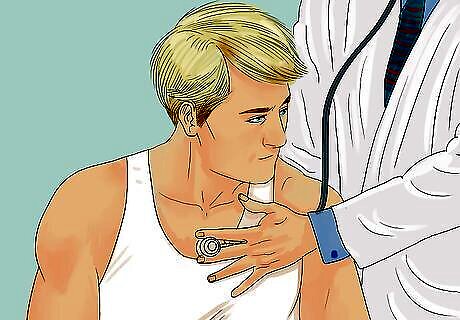
See a doctor if wheezing interferes with your daily life. If you wheeze every day, or if you find yourself unable to perform certain tasks (e.g., running, lifting heavy objects, or swimming) because of the severity of your wheezing, visit your general practitioner. In many cases, wheezing is only a symptom of another condition, like asthma or allergies. Schedule an appointment with your doctor to determine the cause of your wheezing if the symptom lasts for more than a few days. While it may seem like a hassle, visiting your doctor is the quickest and most efficient way to get rid of a persistent wheeze. Visit your doctor or an Urgent Care center promptly if your wheezing is accompanied by chest pain.
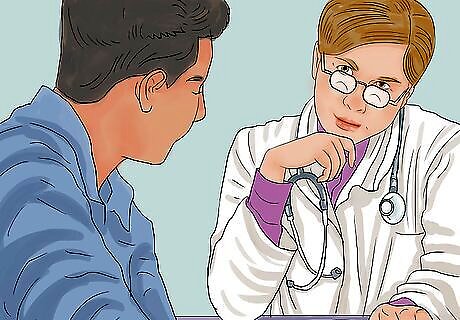
Describe your wheezing and related symptoms to the doctor. Your doctor will ask you questions about your symptoms and triggers. Describe how long your wheezing has lasted, and if any specific triggers, such as exercise, often cause a wheezing fit. They may also listen to your lungs with a stethoscope, and if your lungs have never been evaluated, might ask you to perform a breathing test. Conditions that commonly cause wheezing include asthma, allergies, bronchitis, other respiratory infections, and anxiety disorders. Other tests, including blood tests and chest X-rays, may also be necessary.
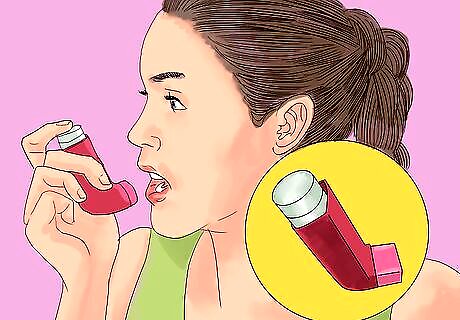
Discuss with your doctor whether or not an inhaler will help. Oral inhalers—often filled with mucous-loosening medicines like albuterol—will instantly stop you from wheezing. So, check in with your doctor and see if they think an inhaler will help you stop wheezing. If your child is suffering from asthma, they may not think to ask the doctor for an inhaler. In this case, ask the doctor on their behalf. Wheezing caused by asthma can also be treated with emergency bronchodilator inhalers, inhaled corticosteroids, long-lasting brochodilator-corticosteroid combination inhalers, and asthma controller pills.
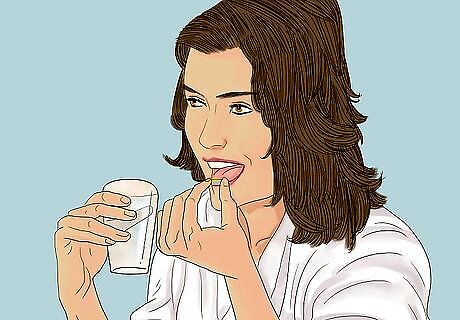
Combat wheezing caused by an underlying condition with your doctor. Professional treatment for wheezing varies depending on the condition causing it. Fortunately, most doctors are familiar with many lung conditions and can effectively diagnose your condition should you have one. After diagnosing the cause, work with your doctor to determine the best treatment plan for your needs. For example, wheezing caused by allergies can be prevented by avoiding any identified allergens. Your doctor may also prescribe a non-sedating antihistamine pill. Talk to your doctor to find out if the root cause of your wheezing could be environmental pollution, an overactive immune system, or gut sensitivity. Conditions like asthma and allergies can be caused by an underlying autoimmune condition, and removing the triggers for your condition could help improve your wheezing. For instance, you might need to remove gluten or dairy from your diet if you're allergic to them. Similarly, treat any underlying infections that might be causing your immune system to attack your lungs instead. Your doctor may prescribe a bronchodilator inhaler to treat wheezing caused by bronchitis, and if a bacterial infection develops, they might also prescribe an antibiotic. Patients whose wheezing stems from an anxiety disorder should seek treatment for their anxiety. This treatment can come in the form of medication, psychological therapy, or some combination of the two.
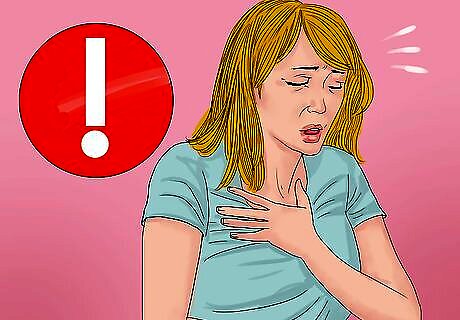
Seek emergency care if your wheezing makes breathing difficult. If you’re struggling to breathe and are concerned that your breathing may soon stop altogether, drive—or have someone else drive you—to the nearest Urgent Care center or emergency room. You should also seek emergency care if you develop severe lethargy, dizziness, or a high fever, or if you notice a bluish tint to your skin while you’re wheezing. Emergency treatment may include a shot of epinephrine to open your airways. You may also need oxygen, corticosteroids, nebulizer treatments, or treatments with a mechanical ventilator. Some of these treatments can seem a little intimidating. But, they’re all painless, and will go a long way towards getting rid of your wheeze.
Relaxing Your Chest and Lungs
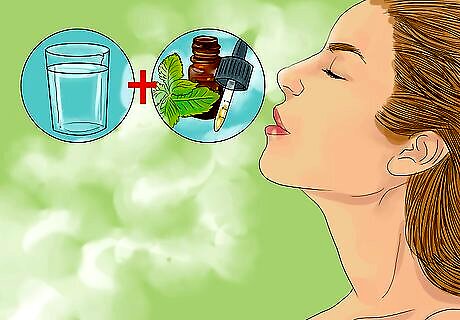
Inhale steam to relax your lungs to loosen their internal airways. Take a steamy shower or run a vaporizer in your room. As you breathe in the steam, the warmth and moisture will relax tense airways and loosen the mucous that’s clogging up the breathing pathways in your lungs. You’ll be able to breathe more easily, and the wheezing should stop after 5-10 minutes. To the same effect, try boiling 1 quart (1 L) of water mixed with 8 to 10 drops of peppermint oil. Once the water begins to evaporate, take it into a small, closed room and breathe in the steam.
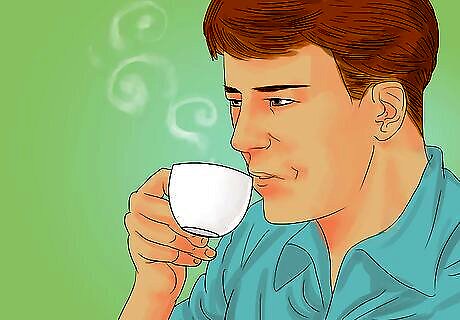
Drink warm fluids to relax your lungs and stop wheezing. When you find yourself wheezing, make a hot drink and sip it slowly over a 10–15-minute period. Herbal teas are a great option, so try sipping on ginger tea, chamomile tea, menthol tea, or licorice root tea. Warm fluids soothe stressed airways in your lungs and will help stop your wheezing. In moderate amounts, coffee can also offer some benefit. Caffeine can dilate the airways, which may make breathing easier and end your wheezing. Since caffeine also dehydrates, though, drink no more than 3 8-oz (250-mL) cups daily and offset it with plenty of hydrating fluids.
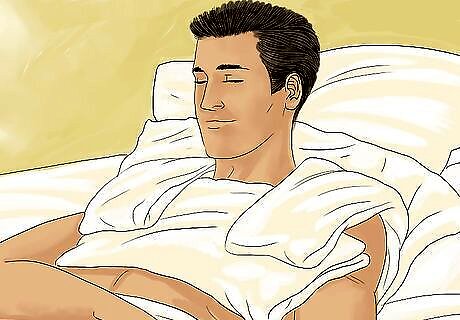
Warm your chest and upper back to relax muscles and airways. When you wheeze and struggle to breathe, your body tenses up and constricts your airways. To combat this and stop wheezing, dampen a hand towel under your kitchen tap and then microwave the towel for 2 minutes. Once it’s warm, rest the hot towel on your chest, upper back, shoulders, and neck for approximately 10 minutes. The warmth will feel good against your skin and will help your lungs relax. Ask a friend or family member to firmly tap on your back while you're heating your torso to help loosen up blockages in your lungs. Instead of a hot towel, you could also use a hot water bottle. Make sure it’s not too hot, though, or you may burn yourself. It should be a temperature that feels good against your skin. Wheezing is associated with tense muscles in your chest, so warming this area of your body can help relax it and will reduce your wheeze.
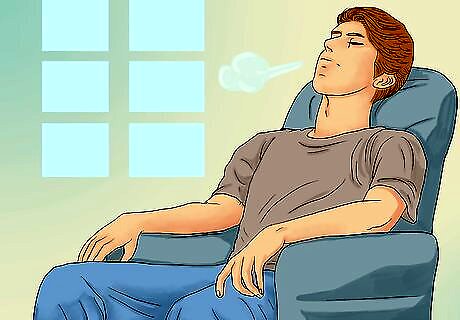
Calm down to relax your body and open up constricted airways. Your body will naturally tense up when you wheezing. As a result, your lungs and throat will become more constricted and you’ll begin to wheeze. Nearly any activity that relaxes you without stressing your lungs can provide some benefit. For instance, try a few breathing exercises, meditating, listening to soothing music, or taking a warm bath. Relaxing your body will loosen up the mucus in your lungs and make it easier to breathe clearly again.
Neutralizing Environmental Triggers
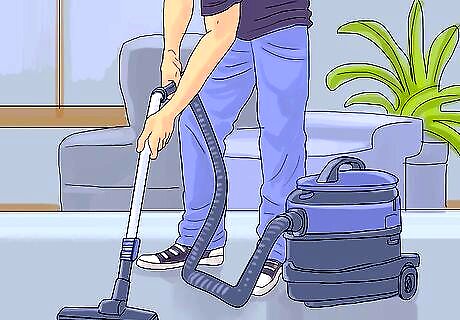
Clean your living environment to remove dust and lung stressors. Removing irritants from the air you breathe can stop wheezing. Dust, sweep, and vacuum your home and office at least once a week. If you have pets, you may need to vacuum every other day to clean up pet dander and fur. Clean or change the filters in your heating and cooling system quarterly, and use (or install) hypoallergenic air filters to trap more respiratory irritants. Run a small air purifier in the rooms you spend the most time in, including your office and bedroom.
Do an elimination diet to find out if you have food allergies. Your immune system may perceive food as a threat, which makes it attack your own body. This can cause symptoms like wheezing, itching, and rash. To determine if your wheezing is related to food allergies, eliminate potential allergens like gluten, dairy, soy, wheat, nuts, shellfish, and artificial sweeteners for 6 weeks. Then, add each food back 1 at a time to see if they affect you. If your symptoms go away while you're on the elimination diet, you likely have a food allergy. If your symptoms return after you eat a specific food, that's likely the food that's triggering your allergies. Cut that food out of your diet to help you feel better. Gluten and dairy are the most common culprits behind food sensitivities. Work with a registered dietitian who can help you design an elimination diet that meets your needs.
Take care of your gut to treat or prevent leaky gut. Leaky gut is a condition where tiny holes in your intestines allow toxins and bacteria to leak into your body, which can cause other medical conditions like wheezing, allergies, or asthma. These holes may be caused by genetics or your diet. Eat a healthy, high-fiber diet with fresh produce, lean protein, and complex carbs to help your gut. Avoid sugar, cut back on alcohol, and limit saturated fats to help protect your gut. It's best to eliminate processed foods from your diet altogether. If you identify any food triggers, eliminate them from your diet. Walking for 15-20 minutes after your meals may also help treat or prevent leaky gut.
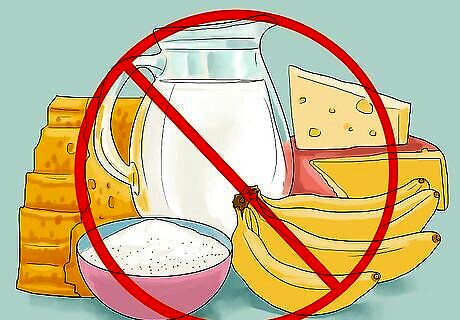
Avoid potential allergens and other wheezing triggers. Exposing yourself to food allergens and environmental allergens can cause wheezing, and foods that produce mucus can make wheezing worse. Foods that produce mucus include dairy products, bananas, and sugar. If you are not quite certain which foods, pollens, and animal dander (if any) you’re allergic to, ask your doctor to perform an allergy test. Treat seasonal allergies that cannot be avoided with over-the-counter antihistamines. Severe seasonal allergies might need prescription medication.
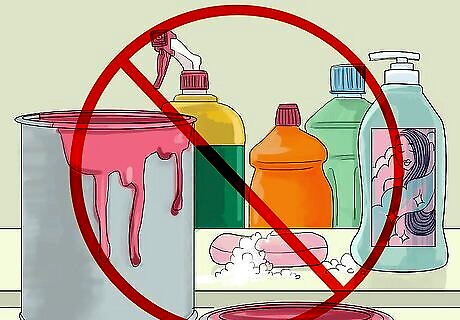
Stay away from potent smells that can constrict your airways. Strong odors aren’t necessarily bad for you when your lungs are healthy, but if your airways are stressed, they may cause those airways to restrict further. Chemical odors, like paint and chemical cleaners, can be some of the biggest culprits, but you should also avoid things like perfumes and heavily scented soaps or shampoo. When inhaled, these potent smells can both cause and worsen wheezing.




















Comments
0 comment